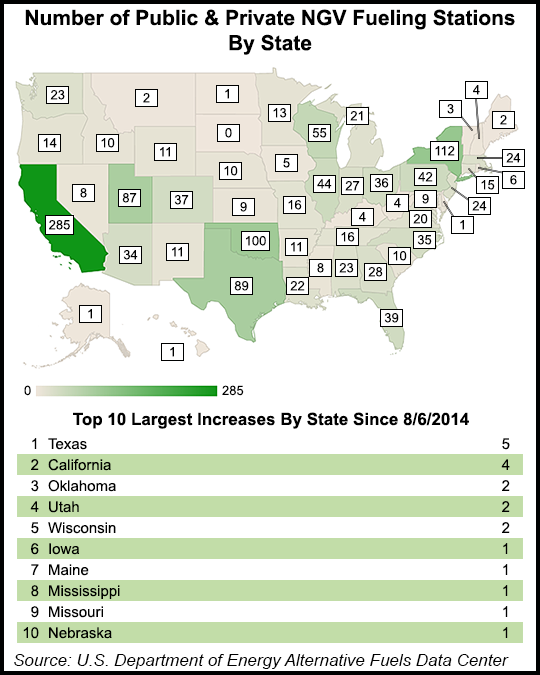Markets | E&P | Infrastructure | NGI All News Access | NGI The Weekly Gas Market Report
Increased CNG Use Prompts Winter Safety Alert
Two natural gas vehicle (NGV) organizations have issued early warnings about severe cold weather and its possible effect on vehicles operating on compressed natural gas (CNG). With more of these vehicles operating on U.S. roadways, the groups are warning CNG providers and operators alike.

NGVAmerica and the Clean Vehicle Education Foundation (CVEF) are reminding CNG providers and operators to properly calibrate their equipment for winter temperatures. NGVs may be over-filled with fuel in extremely cold temperatures, leading to a hazard if weather warms or a vehicle is parked indoors, the two organizations said.
The CVEF recently issued a technical bulletin, “Reliable Temperature Compensation Is Critical to CNG Vehicle Safety,” stating that there are potential hazards from a failure of CNG dispensers to accurately compensate for temperature.
“Proper temperature compensation is essential to safely fuel CNG vehicles, regardless of the station type,” the bulletin said. “Serious incidents” have resulted from the overfilling of CNG containers at both fast-fill and time-fill facilities.
Recommendations include:
Also in the natural gas fueling sector, General Electric’s GE Capital Fleet Services unit has inked an agreement with Pennsylvania’s natural gas transportation fuel promoter, VNG.co, to help spread the use of CNG among light-duty fleet vehicle operators.
VNG’s strategy is to site CNG outlets at existing gasoline stations. Its first location was a BP station in Philadelphia that opened this summer. The GE CNG-in-A-Box compressor package is being used in the effort.
VNG uses the GE system for deployment of its CNG fueling stations. GE Capital Fleet Services CEO Kristi Webb said commercial fleets increasingly want to adopt CNG vehicles.
“The barrier is the cost and availability of CNG fueling stations,” Webb said. “Our alliance with VNG is a step toward breaking down this barrier.” Next, VNG plans to locate five CNG-in-A-Box units in the Boston area.
In Maryland, a grant program wold address expanding the NGV fueling network to help alleviate “range anxiety” among operators. The Maryland Energy Administration (MEA) and the state’s Clean Cities program are jointly seeking applications for a Natural Gas Refilling Station Grant Program to help advance the state’s fueling infrastructure.
The state is making $2 million in grants available, and applications will be accepted through Jan. 12. Matching funds are required.
MEA estimates it would issue four or more grants in support of privately operated, publicly accessible fast-fill stations in the state. Both CNG and liquefied natural gas (LNG) are eligible for the grants as are combined CNG-LNG stations.
The state said one of the key concerns among fleet operators in making a switch to NGVs is the availability of refilling infrastructure.
Elsewhere, Norway-based Hexagon Lincoln recently received orders for $21 million worth of its Titan CNG mobile transport and Smartstore CNG storage modules. The trailer-mounted modules are slated for industrial use in Canada and Mexico. Hexagon’s TitanXL CNG trailer is the largest of its kind.
In Maine, Waste Management Inc., the refuse recycler/hauler, is set to receive the equivalent of 25,000 gallons of renewable natural gas through an arrangement with locally based DriveGreen and U.S. Energy Services. DriveGreen’s system connects Waste Management, the nation’s largest user of NGV refuse trucks, with fuel provider U.S. Energy Services, a unit of World Fuel Services Corp. The system allows operators to calculate the renewable identification number credits they can earn under the U.S. Environmental Protection Agency’s renewable fuel standard (RFS-2).
© 2024 Natural Gas Intelligence. All rights reserved.
ISSN © 1532-1231 | ISSN © 2577-9877 | ISSN © 1532-1266 |
